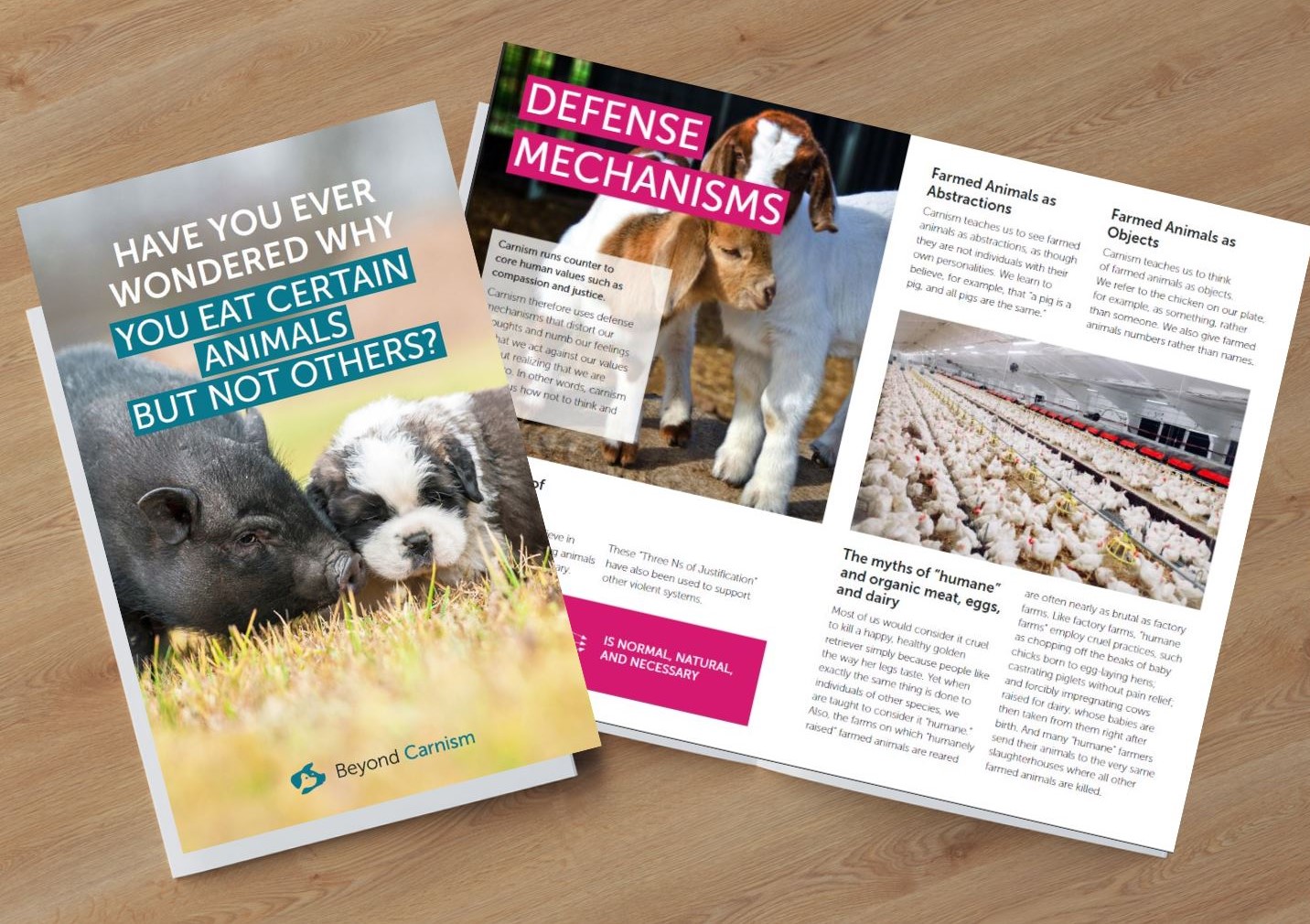Booklet
Our carnism booklet succinctly explains what carnism is, why it’s important to understand, and how to become a part of the solution.
View the digital carnism booklet here.
The booklet is designed so that it can be printed, distributed, and if desired, translated. It can also be cobranded in partnership with a vegan organization.

Booklet References
Page 6
Like dogs and cats, farmed animals are intelligent individuals who have feelings, preferences, and lives that matter to them. Chickens, pigs, cows, and fish are sometimes kept as beloved pets. All animals have the capacity to experience pleasure and pain, and farmed animals suffer no less than any other animals.
Désiré, L., Boissy, A., & Veissier, I. (2002). Emotions in farm animals: A new approach to animal welfare in applied ethology. Behavioural Processes, 60(2), 165–180.
Nawroth, C., Langbein, J., Coulon, M., Gabor, V., Oesterwind, S., Benz-Schwarzburg, J., & von Borell, E. (2019). Farm animal cognition—linking behavior, welfare and ethics. Frontiers in Veterinary Science, 6, 24.
McLennan, K. M. (2018). Why pain is still a welfare issue for farm animals, and how facial expression could be the answer. Agriculture, 8(8), 127.
Düpjan, S., Krause, A., Moscovice, L. R., & Nawroth, C. (2020). Emotional contagion and its implications for animal welfare. CAB Reviews, 15, 46.
Pigs are intelligent and possess traits similar to dogs and chimpanzees; chickens can do basic arithmetic and feel fear; cows form deep and lasting bonds with others in their herd; and fishes are far more intelligent than previously believed and have sensitive pain receptors, as do many other aquatic animals, such as crabs, lobsters, octopuses, squids, and cuttlefish.
Marino, L., & Colvin, C. M. (2015). Thinking pigs: A comparative review of cognition, emotion, and personality in Sus domesticus. International Journal of Comparative Psychology, 28.
Marino, L. (2017) Thinking chickens: A review of cognition, emotion, and behavior in the domestic chicken. Animal Cognition, 20, 127–147.
Marino, L., & Allen, K. (2017). The psychology of cows. Animal Behavior and Cognition, 4(4), 474–498.
Jabr, F. (2018). It’s official: Fish feel pain. Smithsonian Magazine.
Liverpool, L. (2019). Crabs can learn and remember their way through a complex maze. New Scientist.
Birch, J., Burn, C., Schnell, A., Browning, H., & Crump, A. (2021). Review of the evidence of sentience in cephalopod molluscs and decapod crustaceans. LSE Enterprise Ltd.
Meredith, P. (2020) Underwater and underrated: The truth behind fish intelligence, Australian Geographic.
Page 8
The practices described in this booklet are standard in the US.
Female chicks used to produce eggs routinely have their sensitive beaks seared off with a hot blade—without painkiller.
American Veterinary Medical Association. (2010). Welfare implications of beak trimming.
Because male chicks in the egg industry are considered useless, they are ground up alive, gassed, electrocuted, or suffocated shortly after hatching.
Moens, J. (2021). Can new technologies eliminate the grim practice of chick culling? Smithsonian Magazine.
In the dairy industry, cows are forcibly impregnated every year, and their calves are taken away from them just after birth.
Bates, M. (2014). The emotional lives of dairy cows. Wired.Female calves are raised to produce dairy, while the males are slaughtered at the age of four months and sold for veal.
USDA Food Safety and Inspection Service. (2013). Veal from farm to table.
Humane Society Veterinary Medical Association. Facts on veal calves.
Male piglets are castrated without painkiller, so that their flesh will have a more desirable smell and taste.
Wagner, B., Royal, K., Park, R., & Pairis-Garcia, M. (2020). Identifying barriers to implementing pain management for piglet castration: A focus group of swine veterinarians. Animals, 10(7), 1202.
Wild fish caught by commercial fishing methods suffer asphyxiation, crushing in large nets, and exsanguination without stunning.
Across the world, wild fish caught by commercial fishing methods often are asphyxiated when pulled out of the water; crushed in large nets under the weight of thousands of other fish; or slaughtered without prior stunning and left to bleed out.
Eurogroup for Animals. (2021). Eurogroup for Animals launches report on fish welfare in wild capture fisheries.
Farmed fish are typically subjected to poor welfare conditions, including overcrowding, starvation, and inhumane slaughter methods.
Saraiva, J. L., Arechavala-Lopez, P., Castanheira, M. F., Volstorf, J., & Heinzpeter Studer, B. (2019). A global assessment of welfare in farmed fishes: The FishEthoBase. Fishes, 4(2), 30.
https://www.ciwf.org.uk/farm-animals/fish/fish-welfare/
Eating a plant-based diet can help prevent, manage, and even reverse heart disease and type II diabetes; reduce blood pressure; and achieve and maintain a healthy weight.
Physicians Committee for Responsible Medicine. Heart disease.
Physicians Committee for Responsible Medicine. Diabetes.
Physicians Committee for Responsible Medicine. High blood pressure.
Physicians Committee for Responsible Medicine. Weight loss.
Melina, V., Craig, W., & Levin, S. (2016). Position of the Academy of Nutrition and Dietetics: Vegetarian diets. Journal of the Academy of Nutrition and Dietetics, 116(12), 1970–1980.
According to the United Nations, eating a plant-based diet is one of the best ways to offset the most serious environmental problems facing the world today, such as climate change, deforestation, and fresh water depletion.
Schiermeier, Q. (2019). Eat less meat: UN climate-change report calls for change to human diet. Nature, 572, 291–292.
1.36 billion farmed (land) animals are slaughtered globally every week—more than the total number of people killed in all wars throughout human history.
Faunalytics. (2020). Global animal slaughter statistics & charts: 2020 update.
Hedges, C. (2003). What every person should know about war. Simon & Schuster.
Page 13
Also, the “farms” on which such animals are raised are often nearly as brutal as factory farms and they employ similar practices, such as chopping off the beaks of baby chicks born to egg laying hens, castrating piglets without painkiller, and forcibly impregnating cows raised for dairy, whose babies are then taken from them right after birth. And many “humane” farmers send their animals to the very same slaughterhouses where all farmed animals are killed.
PETA. The organic and “free-range” myths.
https://www.vox.com/2015/12/25/10662742/egg-labels-cage-free
https://www.thebalancesmb.com/is-organic-livestock-production-more-humane-2538119